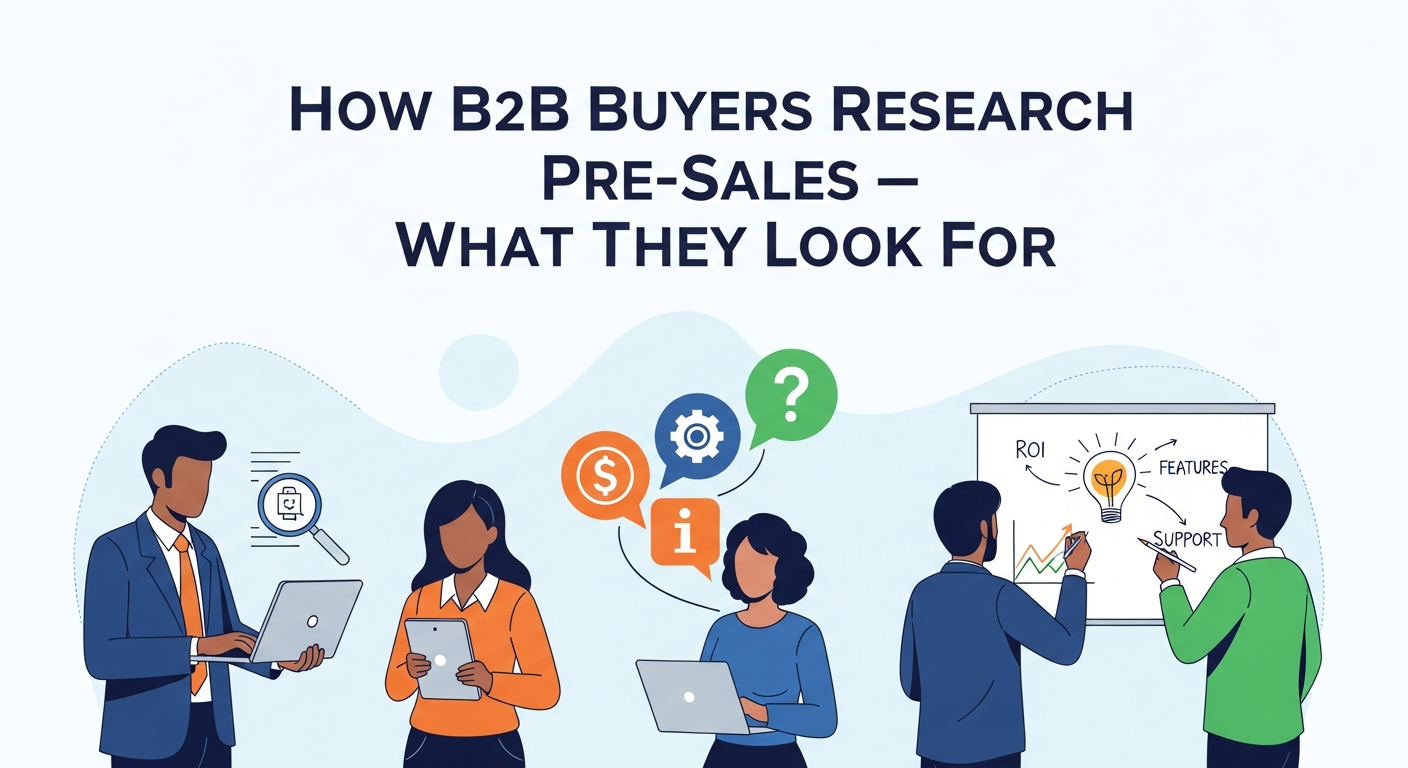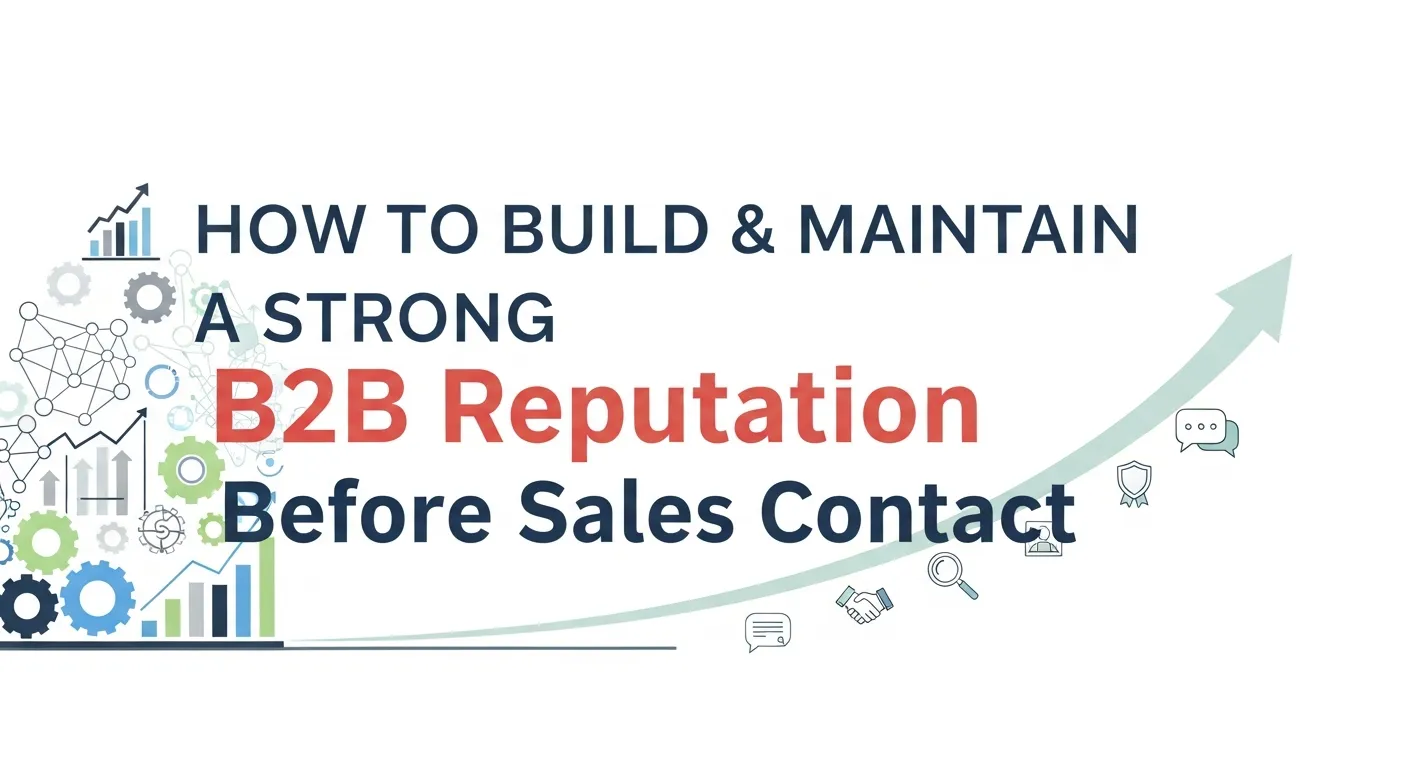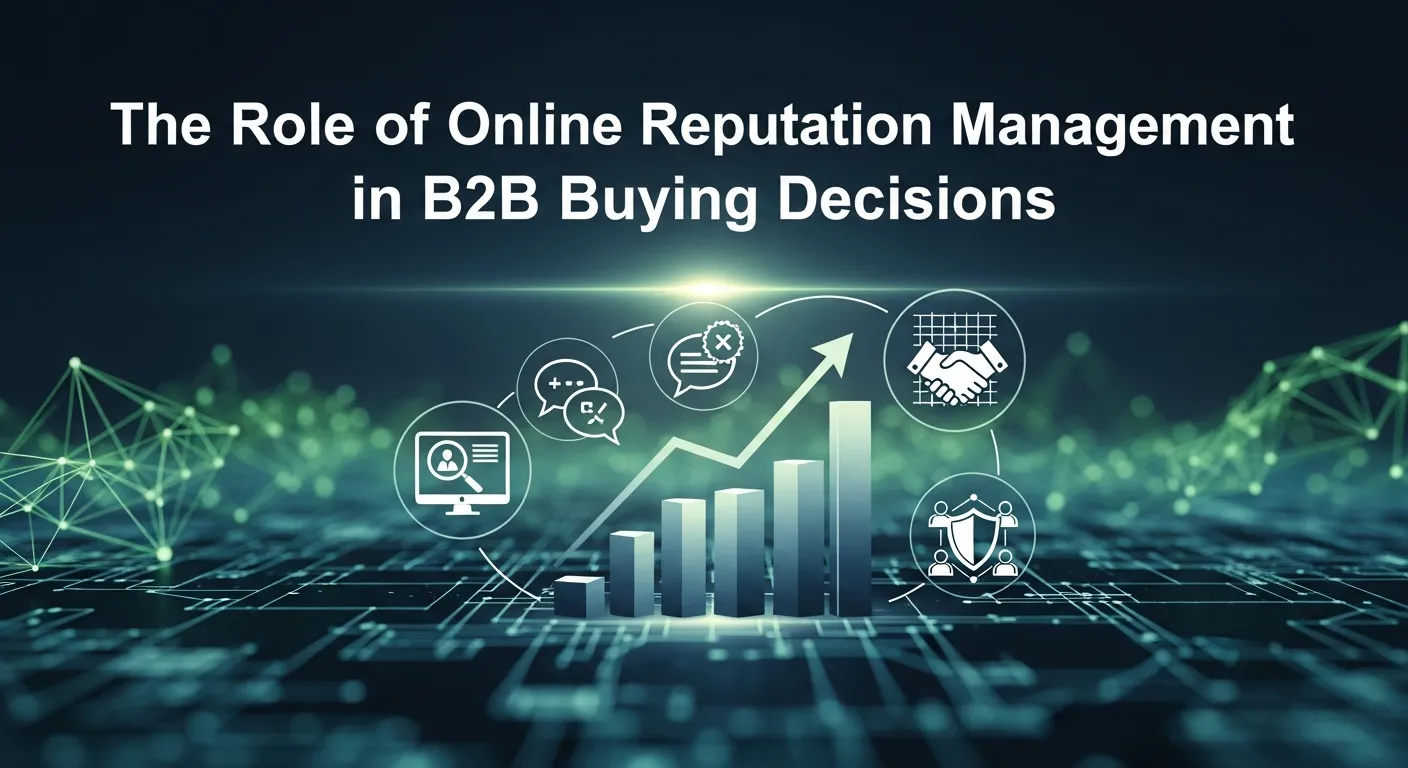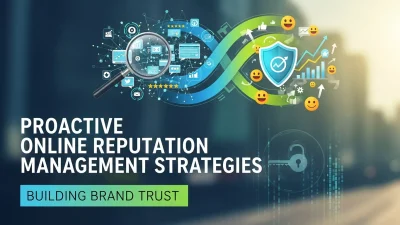In the B2B world, the old sales playbook—cold calls, blitz email campaigns, flashy demos—no longer works as well by itself. Before potential buyers ever reach out to your sales team, they’ve almost already made up their minds. They’ve visited your website, scrolled through reviews, evaluated third‑party content, compared competitors, and often have a sense of whether you are credible, reliable, and worth engaging with.
In this blog, we’ll explore why B2B reputation is now front‑and‑center in the buyer journey, how B2B buyers do research, the risks of letting reputation slide, and actionable strategies for building reputation proactively—so that when buyers come to your door, they come ready to trust.
What Is B2B Reputation — And Why It’s So Critical
B2B reputation refers to how a business is perceived by existing clients, prospects, partners, industry peers, and reviewers. It’s shaped by many inputs: client testimonials, case studies, reviews, third‑party mentions, industry reports, website content, social proof, transparency, responsiveness, etc.
Here are key reasons B2B reputation matters more than ever:
-
Longer Sales Cycles & High Stakes
B2B purchases often involve large budgets, contracts, integrations, long‑term commitments, and multiple stakeholders. Mistakes are costlier. Therefore, buyers want reassurance—evidence that your company can deliver, not just promises. -
“Dark Funnel” & Research‑Driven Decisions
Many buyers do the bulk of their evaluation before they ever engage with a vendor. According to reports, buyers research independently—using search, reading reviews, downloading content, exploring case studies—before ever making contact. -
Trust as a Differentiator
In B2B markets with many similar offerings, reputation becomes a major decision factor. What sets one company apart is not always product features, but trust, transparency, past performance, and reliability. Trusted vendors are often easier to sell to, even at a premium. -
Referrals, Reviews & Peer Validation
Buyers often seek social proof: what other companies in similar positions have done, what challenges they faced, and how your solution helped. Independent reviews, case studies, and customer stories weigh heavily. -
Efficiency & Reduced Risk
Because decision‑makers must justify investment, mitigate risk, and avoid costly mistakes, they want information up front. A strong reputation shortens the time spent convincing and reduces friction in vendor evaluation.
How B2B Buyers Research Pre‑Sales — What They Look For

Understanding what buyers check before they contact sales is essential. Here’s what many B2B buyers research, and why:
| What They Research | Why It Matters |
|---|---|
| Website & Content Quality | Clear, well‑structured websites communicate competence. If you provide whitepapers, blog posts, demos, and comparison sheets, buyers can self‑educate, sharpen questions, and weed out companies whose content feels superficial or generic. |
| Third‑party Reviews & Testimonials | Independent voices—reviews, case studies from existing clients—offer credibility and reduce perceived risk. Buyers want to see proof of success, especially in similar industries or use cases. |
| Peer & Industry Validation | Mentions in analyst reports (Gartner, Forrester, etc.), awards, industry endorsements, partnerships, and certifications matter. They signal credibility and trust. |
| Comparisons & Differentiation | Buyers usually compare you to competitors. They look at pricing, features, service levels, and reliability. If your differentiation isn’t clear, you lose. |
| Transparency & Credibility Signals | Info like response times, case study depth, clarity of pricing, terms, customer support, and track record. Hidden fees or unclear promises will reduce trust. |
| Digital & Social Footprint | What are people saying on forums, LinkedIn, review sites, social media, and blogs? Any negative feedback, unresolved complaints, or even a lack of judgment doesn’t inspire confidence. Buyers see all this. |
Consequences When Reputation Is Weak or Neglected
When a business ignores or underinvests in B2B reputation, there are real costs:
- Longer sales cycles, because buyers need more convincing.
- Higher buyer resistance, more questions, more proof requests.
- Lower win rates among shortlisted vendors.
- Price pressure—buyers may push harder or expect discounting if trust is low.
- Negative first impressions that are hard to reverse.
- Higher customer churn if promises were oversold or expectations are mismatched, and experience doesn’t match reputation.
- Referrals and word‑of‑mouth dry up, limiting growth.
How to Build & Maintain a Strong B2B Reputation Before Sales Contact

Given how much research happens before first contact, you should treat reputation building as part of demand generation, not an afterthought. Here are practices and tactics to strengthen reputation:
1. Invest in Thought Leadership & Quality Content
- Publish blog posts, whitepapers, and research that address industry pain points. Help your potential buyer see you understand their world.
- Host webinars, podcasts, or panels with industry experts.
- Use case studies with credible detail: metrics, outcomes, and how you solved complex problems.
- Regularly update content so it remains relevant, showing you are active and evolving.
2. Collect & Showcase Social Proof
Gather reviews and testimonials from existing customers (ideally those similar to your target). Include names, roles, and measurable outcomes.
Use third‑party review platforms or rating sites relevant in your field (e.g. G2 for SaaS; Clutch for agencies). Keep profiles up‑to‑date.
Encourage referrals. A trusted recommendation from someone inside the buyer’s peer network carries weight.
3. Optimize Your Digital Presence
- The website should be clean, fast, mobile responsive, and easy to navigate. Ensure value propositions are obvious.
- Make essential information easy to find: case studies, past clients, partners, support, pricing or at least pricing models, certification, security/compliance.
- Maintain consistency in messaging and branding across all touchpoints: website, blog, social media, marketing collateral.
4. Be Transparent & Open
- Openly share success and challenges—e.g. lessons learned, trade‑offs, case study failures if relevant. It builds trust because buyers know no vendor is perfect.
- Make contact options obvious. Provide easy ways for buyers to get deeper info or clarification.
- Display proof of reliability: SLAs, uptimes, security protocols, customer satisfaction data.
5. Engage With Industry & Peers
- Participate in industry events, webinars, and conferences. Speak when possible.
- Publish or get featured in analyst reports or independent research.
- Partner with respected organizations or experts. Having your company endorsed or associated with credible third parties helps boost your reputation.
6. Manage Reviews & Feedback Proactively
- Monitor for reviews across platforms and forums. Don’t wait for the feedback to come to you.
- Respond to negative feedback professionally and in a timely. Show that you listen, resolve issues, and learn.
- Encourage satisfied clients to leave feedback. Set up processes or automation for post‑delivery follow‑ups.
7. Align Internal & External Reputation
- Ensure customer experience delivers what your brand promises. A reputation built on claims will crumble if service fails.
- Invest in support, product quality, reliability, and ongoing customer success.
- Train teams so everyone understands what reputation means for the business.
The Role of Online Reputation Management in B2B Buying Decisions

In B2B markets, online reputation management is no longer a support function—it is a growth lever. Because buyers conduct extensive research before speaking to sales, what they find online often determines whether your company even makes it onto the shortlist.
B2B reputation today lives across search engines, review platforms, analyst sites, social channels, and industry forums. If these touchpoints are inconsistent, outdated, or unmanaged, buyers may quietly move on—without ever giving your sales team a chance.
Why Online Reputation Management Matters in B2B
Unlike B2C, B2B buying decisions involve risk mitigation, internal justification, and long-term accountability. Buyers are not just evaluating your product—they are evaluating your company.
Key areas where online reputation management directly influences B2B decisions:
- Search visibility: Buyers Google your brand name, leadership team, and even “Company name + reviews.”
- Negative search results: Outdated complaints, unresolved reviews, or misleading third-party content can quietly erode trust.
- Customer feedback signals: Reviews, testimonials, and case studies act as proof that your claims hold up in real-world use.
- Reputation in marketing: Your reputation supports (or undermines) your positioning, messaging, and credibility across campaigns.
Best Practices to Manage B2B Reputation Proactively
- Monitor online reviews consistently: Track reviews across Google, G2, Clutch, industry platforms, and niche forums.
- Respond with intent: Professional, thoughtful responses to feedback—especially negative feedback—signal accountability and maturity.
- Own your narrative: Publish authoritative content that ranks for your brand and category, pushing negative or irrelevant search results down.
- Integrate reputation into demand generation: Reputation should support sales enablement, content marketing, and outbound efforts—not sit in isolation.
- Close the feedback loop: Use customer feedback to improve product, service, and messaging—then communicate those improvements publicly.
Strong B2B reputation management ensures that when buyers research you, what they see reinforces confidence instead of raising doubts. When done well, reputation becomes a silent sales partner—working long before the first call.
Real‑World Statistics & Case Studies
- A survey by GoodFirms found that “vendor reputation” was among the top three factors influencing buying decisions among B2B service buyers, alongside pricing and service quality.
- Reputation.com notes that 94% of B2B buyers say reviews from industry peers are important in their purchasing decision.
- Research from Forrester shows B2B buyers don’t just trust vendor marketing—they rely heavily on peers, analysts, current client referrals, and third‑party sources.
- Studies show that weak or fragmented brand reputation leads to lost deals, longer sales cycles, and greater buyer hesitation. (Aggregate from various sources above.)
Suggested Roadmap: Reputation Building Before Sales
Below is a suggested plan to build & leverage B2B reputation so that when sales show up, buyers are already inclined to trust, engage, and convert.
| Time Frame | Action Steps |
|---|---|
| Weeks 1–2 | Perform audit: evaluate your current reputation sources—what reviews exist, what content is published, how your website appears, who talks about you. Identify gaps. |
| Weeks 3–4 | Collect fresh case studies/testimonials. Optimize your website: update messaging, ensure key reputation signals are visible. Set up monitoring tools for reviews, social mentions, and reputation tracking. |
| Month 2 | Publish thought leadership content. Engage with industry experts. Participate in external reporting and guest posts. Build or update profiles on review platforms relevant to your field. |
| Month 3 | Automate feedback processes and review generation. Improve transparency (pricing, SLAs, support). Start responding to all reviews. Encourage referrals. |
| Month 4 & Ongoing | Measure: monitor metrics like number of reviews, average rating, content performance, number of vendor comparisons before first sales meeting, etc. Adjust strategy. Refresh content and testimonials. Stay consistent. |
FAQs: B2B Reputation
1. What is B2B reputation?
B2B reputation is how a business is perceived by prospects, customers, partners, analysts, and peers. It is shaped by reviews, customer feedback, content quality, third-party validation, and overall online presence.
2. Why do B2B buyers research vendors before contacting sales?
Buyers research vendors to reduce risk. Since B2B purchases involve high stakes, long-term commitments, and internal approval, buyers want confidence before engaging with sales.
3. How much of the B2B buying journey happens before sales contact?
Research suggests that 60–80% of the buying journey often occurs before buyers speak to sales. During this time, buyers compare vendors, read reviews, and assess reputation independently.
4. How does B2B reputation impact sales performance?
A strong reputation shortens sales cycles, improves win rates, reduces price resistance, and increases buyer trust. Weak reputation leads to hesitation, longer evaluation, and lost deals.
5. Are reviews important in B2B buying decisions?
Yes. Customer feedback and peer reviews are among the most trusted sources for B2B buyers. Reviews validate claims, demonstrate real outcomes, and reduce uncertainty.
6. What happens if a company ignores its online reputation?
Ignoring online reputation management can result in:
- Negative search results dominate brand searches
- Lower trust during vendor evaluation
- Increased buyer skepticism
- Fewer inbound opportunities
Often, buyers simply move on without explaining why.
7. Can a strong B2B reputation justify higher pricing?
Yes. Buyers are often willing to pay more for vendors they trust—especially when risk, complexity, or long-term impact is high. Reputation often offsets price sensitivity.
8. How can newer B2B companies build a reputation quickly?
Newer companies can build a reputation by:
- Publishing high-quality thought leadership
- Creating detailed early case studies
- Leveraging partnerships and industry experts
- Actively collecting and showcasing customer feedback
Depth and transparency matter more than volume early on.
9. How does reputation in marketing support sales teams?
Reputation in marketing builds credibility before sales conversations begin. When buyers already trust your brand, sales teams face fewer objections and more productive discussions.
10. How long does it take for B2B reputation efforts to impact revenue?
Reputation building is a medium- to long-term investment. Many companies see early improvements within months, but sustained impact compounds over time through consistent execution.
Conclusion
In modern B2B sales, reputation is often the buyer’s gatekeeper. Before your sales team ever speaks, potential customers have already formed opinions—based on your content, reviews, peer validation, online presence, social proof, and more. The difference between winning and losing often lies in how strong, credible, and trustworthy those first impressions are.
Investing in B2B reputation isn’t just a marketing exercise—it’s a foundational part of your sales strategy. By treating reputation building as central (not optional), aligning internal quality with external perception, and proactively managing feedback and social proof, you set your company up not just to be one of the vendors considered, but to be the vendor chosen.
Learn more about: How to Handle Negative Feedback: A Complete Guide




